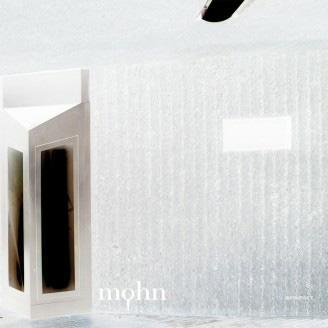Under the guise Burger/Ink, Jorg Burger and Wolfgang Voigt unleashed their seminal techno
collaboration Las Vegas in 1996. Released on US label Matador, its well-trodden concept of an American road trip soundtrack, via pop-culture references to Roxy Music in song titles like ‘Do The Strand’ and ‘Love Is The Drug,’ marked the LP out as something of a global gateway into the ascending Cologne techno scene, blending trans-Atlantic influences to great effect. Beyond that though, it also echoed what British acts like The Orb had done with house music in the wake of the acid-house boom: even as Burger/Ink were introducing the outside world to their party, they themselves were already looking towards the bleary light of the morning after.
In hindsight, there’s a case to be made for that record marking the end of something for Voigt in
particular, even as he opened up the Cologne scene Stateside. Around the same time he released the first of four glorious LPs under the moniker Gas; steeped in a heavy ambience, any 4/4 patterns found in its thick textures seemed merely to echo as ghosts of his past, replaced instead by a wider variety of timbral experimentations. Two years later in 1998 he’d co-founded Kompakt with the guys he started a record shop with back in 1993 – brother Reinhardt Voigt and contemporaries Michael Mayer and Jurgen Paape. Techno was, and is, still very much the remit of the label. However, Voigt himself increasingly has moved beyond its limitations, even when – as on 2008’s collection of disjointedly atonal piano pieces Freiland Klaviermusik – the process seemed more important than the final result.
Mohn is the first full-length collaboration between these two old friends since Las Vegas. The
focus feels on Voigt because, although Burger too has moved on stylistically since that last full union – the highpoint perhaps being 2004’s terrific Im Funftonraum under his Triola umbrella – this new record lends itself far more to the Kompakt chief’s signature meanderings. Slightly ironically for a pair of artists who sought to maintain anonymity in techno music by constantly shifting aliases, Mohn sounds like it couldn’t be anything other than a Kompakt release – possessing as it does the certain kind of fleeting tension typical of the label’s back catalogue, one just strong enough to disrupt its otherwise ambient drift.
Much like Las Vegas did some sixteen years ago, the nine tracks that make up Mohn possess both echoes of the pair’s creative past as well as potential signposts as to their future. Still prominent is the use of repetition, and the shuffling nuances of each returning loop. Fourth track ‘Saturn’ is the most direct example of this, finding an isolated groove somewhere out in the cosmos early on and observing earth from a lonely vantage point. Elsewhere though, there are remnants of Voigt’s penchant for breaking up structure, a la Freiland
Klaviermusik. Indeed, each track here has its own definitive personality, all linked to one another in tone, perhaps, but coming from different vantage points. As a result, Mohn as a whole can be a little disjointed at times.
Taking each piece on its own, though, unveils a fascinating stitching together of the pair’s past
and present. For instance, ‘Ambientot’ could fit comfortably alongside Gas, thanks to its isolated rhythm. It’s more pronounced here, yes, but nevertheless largely submerged in drifting atmospheric flotsam. ‘Das Feld’, meanwhile, cuts out any sharp edges whatsoever and billows for six minutes in a faded fug. Elsewhere, flickers of techno (still largely Burger’s domain) enter the fray in the likes of ‘Seqtor 88’ and ‘Ebertplatz 2020,’ but they’re views of Burger and Voigt’s four-to-the-floor past through a sepia-toned mirror, these current works many times removed
from that intensity of old. Signposts of progression come at the LP’s very beginning. ‘Einrauschen’ is dominated by abrasive drones; were it from the UK it could be filed alongside Fuck Buttons’ first album. Next, ‘Schwarzer Schwan’ – dare it be uttered – isn’t a million miles from witch house, all cathedral murmurs and heavy reverb.
Las Vegas, in retrospect, drew a line in the sand after all that Burger and Voigt had achieved up to that point. Mohn doesn’t quite do the same. You sense that the pair’s love for the softer edges of music is now deeply ingrained, and the new sounds here aren’t enough of a departure to suggest a move away from that. Nevertheless, this new collaboration is a wonderful demonstration and crystallization of the best aspects of their combined canons. And like all good Kompakt releases, it feels like something of a sandbox, always contemplating the possibilities of next.


